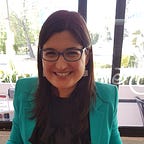Leaving Monolingualism Behind
Between the ages of 8 and 14, we lived across the street from the public library. And even though we lived in an apartment with one bathroom, that library was worth it. That library transformed me.
In the summers, I would walk across the gravel parking lot, up a short grassy hill, cross a street, and enter the sacred doors. Usually I would go straight to the Classics rack that was near the front, and spin titles until one caught my eye. I read Dickens and Austin and Dumas.
I loved English with my entire being. I loved entering into a story, connecting with characters, traveling to other times and places, transforming myself to live another life — as another gender, age, race, social class, political ideology, religion, and on.
I loved English so much I chose it as my undergrad major. And then for my grad school program. Since 2014, I have officially been a Master of the English language.
But speaking only English, reading only English, understanding only English is limiting. And as I grew up and wrote my own stories, I realized I was limited in experiences.
Because while translation is magic, there is still the hand wave, the movement to make one language seamlessly slide into another.
There is always a trick up the translator’s sleeve — the slight of hand that eliminates an untranslatable joke or deletes a vulgarity or diminishes the power of an insult.
Translation — while wonderful — has limits.
We can never fully know the meaning of a translated work. There is always the slight feeling that we have not quite understood.
So while I have read “The Metamorphosis” by Franz Kafka several times, the full weight of the transformation is lost. Because I don’t know German.
And while the imminent nature of technology dissuades us from learning another language through the ease of translation apps, don’t give in.
Don’t settle for Monolingualism.
Monolingualism will keep you stuck in one lane, always forced to listen to one cover band, while driving one speed limit.
So what must one do to leave Monolingualism? Pick a language, any language, and stick with it.
Listen to music, watch series, download a language app, find a conversation partner, read a children’s book. Learn to be confused.
Because some things just don’t translate well.
Take the word aguantar in Spanish — my current second language. When I think aguantar, I feel a certain way.
Google Translate says it’s “to put up with”. And while this is true in some situations, it just doesn’t work in all situations.
Sometimes I might say “I need to hold out a bit longer” or “keep on going, don’t give up” or “listen to me a little more” or “I can’t stand this”.
My best effort at translating this one word is “to endure through a difficult situation”. Which is exactly what you will have to do when learning to walk away from Monolingualism.
You will struggle. You will feel uncertain. You will return to feeling like a child who doesn’t know how to express their emotions, so a tantrum might ensue.
But that’s okay. That’s part of walking into a deeper understanding of Self. That’s part of entering into a new way of thinking, a new way of perceiving the world and yourself.
When I finally broke through the barriers and became fluent in Spanish, I felt the difference. And all those years of pushing against the resistance — the tears on my bathroom floor because I had no friends who fully understood me because I could not entirely express myself — the struggle for enlightenment was hard won.
Leaving Monolingualism will force you to make new friends, meet new people, experience the world through different eyes. And it will be worth it. Because you will learn to aguantar.
And then, you might find yourself (like I did) wanting to push the limits again. You might find that Bilingualism has opened doors, but there are still so many more to be opened.
Years down the road, you might find yourself venturing into the world of Multilingualism. It will feel similar to Bilingualism, but you will now know the way. You will have the tools and structures to move further faster.
I have recently ventured into Multilingualism by starting anew on the road to learning German. And I hope one day I won’t just be able to read Dickens in English and Dumas in Spanish, but also, Kafka in German and finally fully understand.
